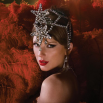FOX premiered the introduction sequence to its upcoming animated television program Major Lazer, which is of course based on Diplo's side project of the same name. The title character—long known to electronic music fans as a muscular Jamaican man with a beret, sunglasses and laser cannon for an arm—will be the protagonist and get assistance from characters named Penny and Blkmrkt. Apparently his main nemeses on the program will be the demonic President Whitehall and robotic General Rubbish. We can't gauge too much else from the clip, aside from Lazer riding a Back To The Future-style hoverboard.
You can check out the clip below and then consider five other musical acts that tried to make a more dramatic jump to animation.
The Beatles (1965)
The Beatles weren't only the first musicians to get an animated series in their name...they were also the first real people in general to have a weekly animated series. The series ran for 39 episodes over two years, featuring the band in expectedly absurd scenarios, very loosely based on song titles from the group's oeuvre. The first ever episode had a Halloweenish theme, coincidentally enough, as the band retreats to a Transylvanian castle during "Hard Day's Night" to escape its fans. The series also featured somewhat telling band psychology: John Lennon was the accepted leader, and he often submitted Ringo Starr and George Harrison to his bidding. Paul McCartney tended to be snarky, although not as imperial as his Lennon. No, unfortunately none of The Beatles actually voiced themselves.
The Jackson 5ive (1971)
Berry Gordy and Motown knew they had a hit on their hands with The Jackson 5 and he went all-out to cash in before the act could fizzle out (it didn't). The result was a weekly cartoon show based on the adventures of the five Jackson brothers and a few of Michael's numerous real-life pets. Although father Joe Jackson is now notorious for his management of his sons' group during that era, Gordy must have recognized that might look bad on television. He appeared as the 5's adult supervision on the show, frequently pitching hair-brained ideas on how to promote themselves...like working on a farm for example. Alas, none of the boys nor Gordy had time to voice themselves although the real Diana Ross appeared as herself. The show became best known for its awkward laugh track, which seemed absurdly intense in comparison to other animated shows at the time.
The Osmonds (1972)
The Osmonds took the formula from The Jackson 5 and launched an animated program of their own, kind of like how the Osmond Brothers band borrowed its musical hit-making format from the Jackson 5. Heck, this show was even animated by Rankin/Bass, the same duo that launched The Jackson 5ive. There are some places where this show overtakes it predecessor however. For one, the Osmond Brothers actually lend their own voices to their animated selves. Secondly, Jimmy Osmond's pet dog Fuji deserves to be an idolized cult character: It's an Akita dog that speaks telepathically in an over-the-top Japanese accent. "Fuji think hard work ahead," he says/thinks in the clip below. "Good clock supposed to strike on the hour. That clock just on strike " (fast forward to 12:25).
New Kids on The Block (1990)
The world briefly decided that animated versions of hit musicians was coming back during the early '90s and the New Kids on The Block were the first victims. On the other hand, if you're watching classic cartoons while tripping out of your mind, New Kids on The Block is the right stuff. The best example we can suggest is at the 3:30 mark of the clip below where recurring character Nikko (another dog) "finds" the New Kids in the woods. The ground then explodes, forming a Mount Rushmore-esque statue of the band, which chants "the right stuff!" before switching scenes. Although this is later seen to be a dream sequence, the show doesn't relax at all. The musicians don't voice themselves but the voice actors sound even more absurdist-Boston than the originals. Also note that Donnie Wahlberg and Nikko are credited to the same voice actor. Watch to the end for dancing bears.
Hammerman (1991)
Give the producers behind Hammerman some kudos aside from just throwing our title character, MC Hammer, who voices the protagonist Stanley, a dancer given a pair of magical shoes that help him defeat criminals. The opening credit sequence is actually a handy metaphor for the transition of popular music in the black community, noting how the original owner of the shoes, Soulman, has gotten too old so he hands them over to the more hip-hop friendly Hammerman. At the end of every episode, a puppet version of the magic shoes would appear to Hammer's child audience and give them advice on dealing with real life issues, in school and otherwise. The good intentions don't really make up for the shenanigans going on in Hammerman's life but makes this program a bit cuter.
© 2025 MusicTimes.com All rights reserved. Do not reproduce without permission.




